World Cup Rewind: 2011 - When hope killed Wales' World Cup dreams
- Published
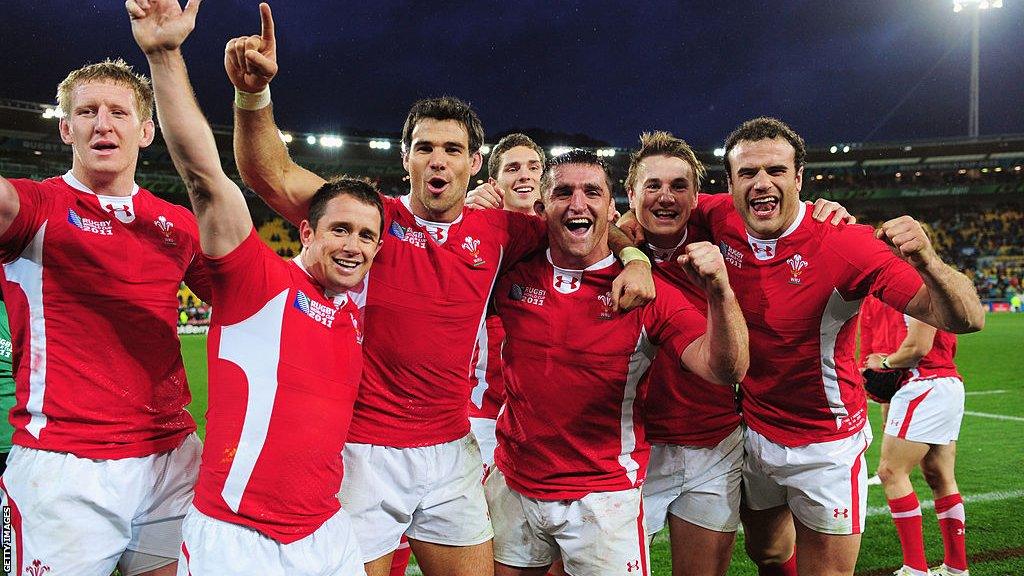
Fresh faces and new success for Wales at the 2011 World Cup in New Zealand
New rugby heroes and villains, a royal scandal and an infamous red card.
Having been threatened by an earthquake just months before kick-off, New Zealand 2011 would have it all.
Warren Gatland led Wales to a World Cup for the first time and a new generation that included the tournament's youngest ever captain came within a tip-tackle of a maiden final appearance.
In the latest in a series reflecting on past World Cups, BBC Wales Sport looks back at 2011 with Mike Phillips.
Wales look to the future
Despite strong support for Japan, New Zealand won the right to exclusively host the tournament for the first time. However, preparations were blighted by concerns over costs and inadequate infrastructure.
A proposed new 70,000-seater stadium in Auckland harbour was scrapped, so Eden Park was upgraded instead, but bigger problems were to come.
At 12:51pm on 22 February, a 6.7 magnitude earthquake struck close to downtown Christchurch, killing 185 people and causing widespread damage. New Zealand was in mourning but rugby would help lift the nation.
In Wales, head coach Gatland had a dilemma. His Grand Slam-winning team of 2008 were waning and an injury to Six Nations captain Matthew Rees, as well as the loss of Gavin Henson, Richard Hibbard and Morgan Stoddard during the summer warm-up games, sparked a rethink.
Gatland was in fact looking more to the 2015 World Cup in selecting Test rookies such as George North, Taulupe - then known as Toby - Faletau, Rhys Priestland, Scott Williams and Ken Owens.
Dwayne Peel was axed while veteran Martyn Williams - on 99 caps - was replaced by his Cardiff understudy Sam Warburton who, at just 22, was handed the captaincy.
"I think there were a few of us who kept getting into trouble so Gats [Gatland] gave the job to Sam, the one person who didn't drink," joked Phillips.
"A lot of youngsters came through that no-one really knew a lot about but would become household names by the end of the tournament.
"We also had Andy Powell in the squad so we were never going to be bored."
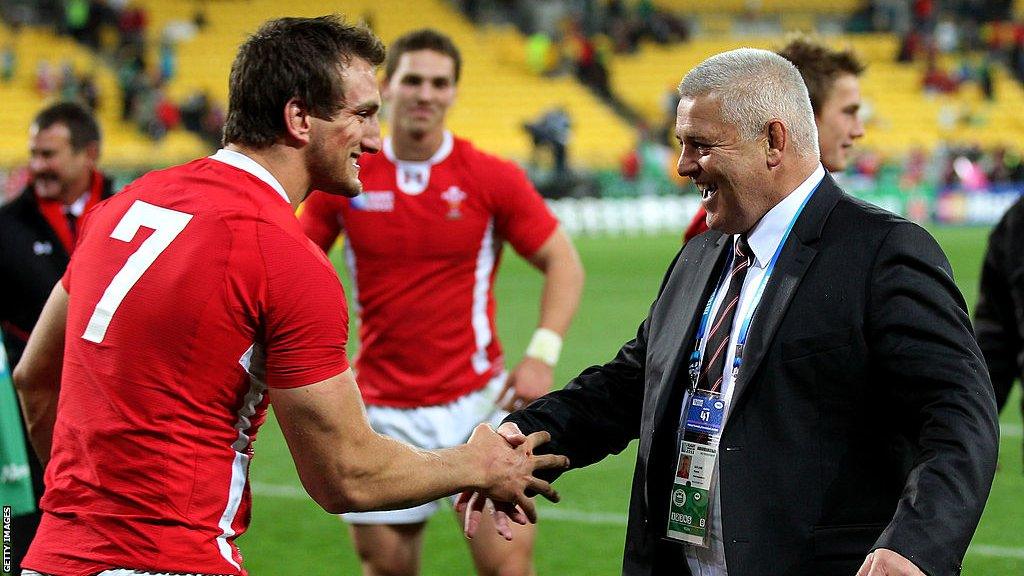
Warburton, aged 22, became the youngest captain in World Cup history
Phillips almost did not make it to New Zealand. He was suspended from the squad following a late-night confrontation outside a McDonalds restaurant in Cardiff city centre in June. The scrum-half had also just been released by Ospreys and broken up with singer girlfriend Duffy.
"Gats was great to me. He just told me to sort my head out and, in a funny way, all that nonsense really focused me to train harder. I turned it into a positive to knuckle down," said Phillips.
"I think it helped that we were the other side of the world, away from the pressure of Wales. No-one expected much and England seemed to be taking all the bad press away from us."
England embarrassment
England edged past Argentina and Scotland to top their pool but, off the pitch, were branded embarrassing and accused of lacking respect.
James Haskell, Chris Ashton and Dylan Hartley were reprimanded by head coach Martin Johnson for their treatment of a female member of hotel staff in Dunedin.
Just days later, Mike Tindall was among a group of players criticised for their conduct on a night out in - of all places - Queenstown.
Tindall had married the Queen's granddaughter Zara Phillips just six weeks earlier but was the subject of tabloid headlines when seen drunkenly enjoying a night out, accompanied by a former girlfriend, at a bar hosting a "dwarf-racing" contest.
Tindall refused to apologise even though his recollection of his movements proved to be incorrect and was later fined £25,000, external by the RFU.
More followed, even after England were knocked out of the quarter-finals, when centre Manu Tuilagi was formally warned by police and fined £3,000 by England after jumping from a ferry in Auckland.
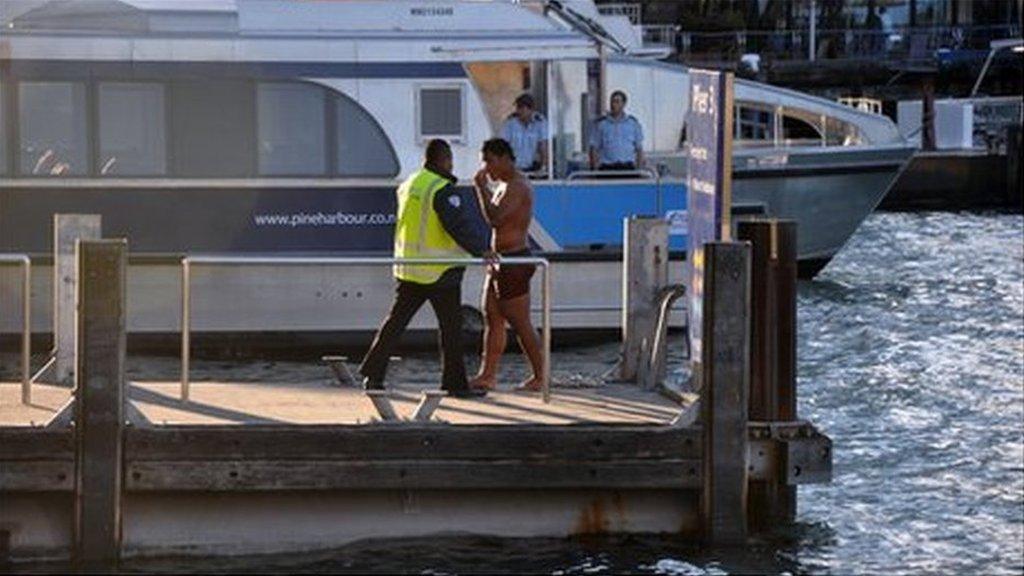
Manu Tuilagi emerges from the water after jumping off a ferry in Auckland
While England's misadventures became a media circus, Wales were taking the World Cup by storm for all the right reasons.
Faletau scored and Warburton was man of the match as Wales pushed defending champions South Africa close, losing 17-16, in the opener.
However, they recovered with a crucial win over Samoa (17-10), a Welsh record World Cup victory (81-7) against Namibia and an impressive 66-0 demolition of Fiji.
Elsewhere, Russia's first ever World Cup game was a 13-6 loss to the USA in a pool topped by Ireland after they shocked Australia (15-6) to set up a mouth-watering quarter-final with Wales in Wellington.
"We felt at that time that we had the edge on Ireland, both with our regions and Wales," said former Ospreys star Phillips.
"There was quite a rivalry brewing because we all knew each other so well and some of their players always seemed to be talking about what we were up to."
He grinned: "I also think they were still sore about a try I had scored against them earlier that year that may have been a little controversial."
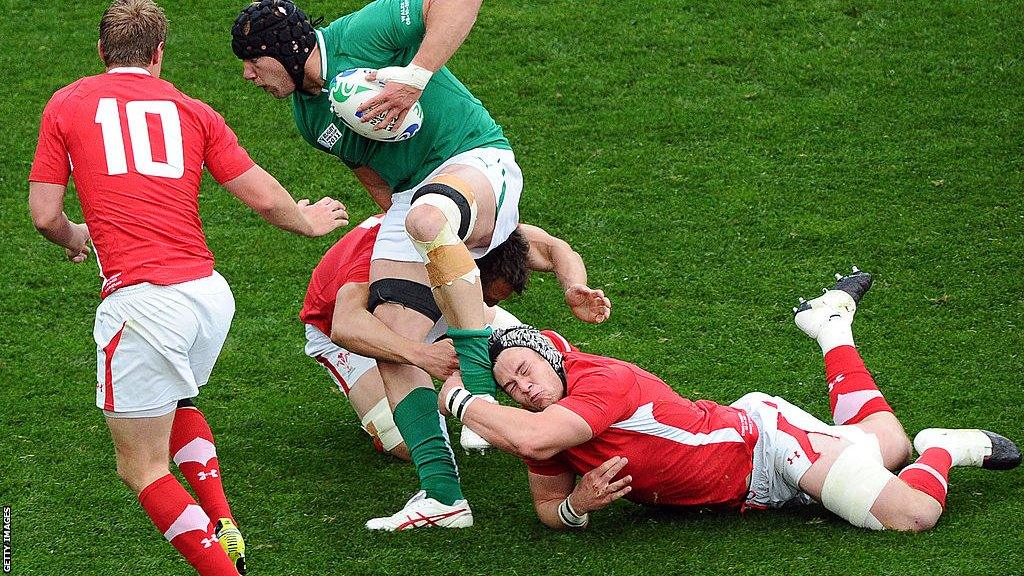
Flanker Dan Lydiate's chop tackles took Ireland by surprise in their quarter-final
Ireland fully anticipated reaching the semi-finals for the first time but Wales unleashed a new tactic in Dan Lydiate's chop tackles that cut down Irish runners at source.
Phillips touched down, again, while tries from Shane Williams and Jonathan Davies clinched a 22-10 win that was as close to a complete performance as Gatland's Wales would produce.
"Dan was immense that day but so was everyone. Faletau was phenomenal as was Luke Charteris. Not many people talk about him but he was an absolute monster with his tackles and at the line-out," said Phillips.
And so to the semi-final, Wales' first since the inaugural World Cup, also in New Zealand, 24 years earlier.
France had been in disarray, losing twice in the pool stage, to New Zealand and Tonga, with head coach Marc Lievremont said to be heading out of the door.
Such was the excitement in Wales that more people watched the game on giant screens inside the Principality Stadium than the 58,600 at Eden Park, but Phillips slowly grew concerned.
Warburton's red card
"Rhys Priestland had been ruled out beforehand, which was a real shame as he'd been so influential in the way we had played," he said.
"We knew we wanted to play a fast-tempo game against the big French pack. During the warm-up it was dry - perfect I thought. Then five minutes before kick-off it absolutely bucketed down.
"Then we lost Bomb [Adam Jones] early, which was a massive blow to our scrum, and I started to worry that it was one thing after the other. Then came the card."
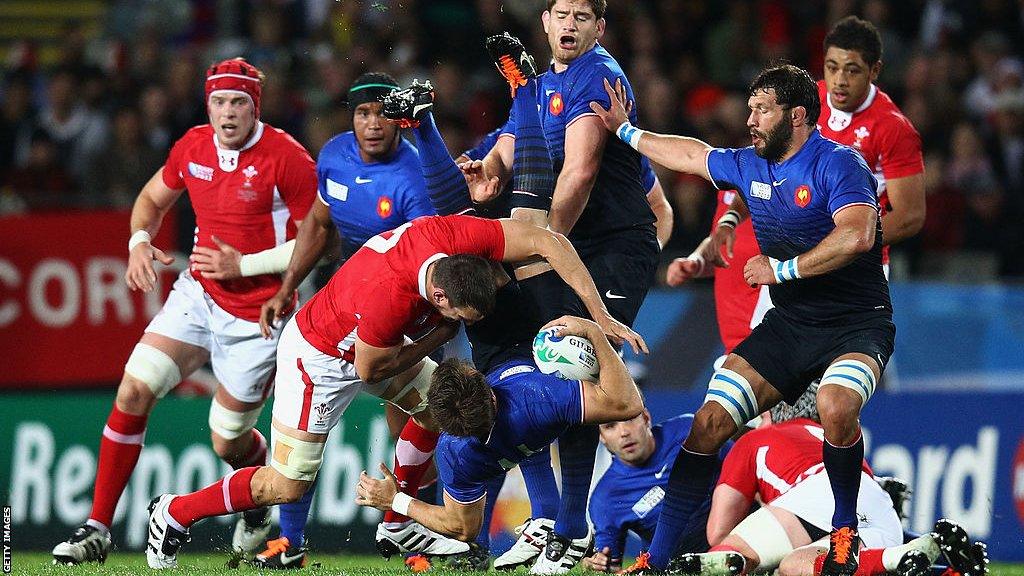
Wales played for more than an hour of the semi-final with 14 men after Warburton was sent off
The story of Wales' glorious World Cup odyssey would ultimately be decided in the 19th minute, with a flash of referee Alain Rolland's card. Warburton tipped wing Vincent Clerc upside down and Wales' world went with it.
"I couldn't believe it when I saw the red card, none of us could," recalled Phillips.
"There was a bit of disarray at that moment and James Hook, who was playing 10, asked me what are we going to do.
"I said we just stick to the gameplan. Gats' plan wasn't exactly complicated so that helped give us direction. We were just going to need to work a bit harder."
A stirring, tireless second-half display somehow kept Wales in touch and Phillips scored the game's only try to set up a desperate finale.
But Stephen Jones hit the post with the conversion - after Hook twice missed in the first half - and Leigh Halfpenny came up just short with a long-range penalty at the death.
Most close-fought contests have their fair share of almosts and nearlys. This 9-8 loss had all of those, and enough whys, if onlys and what ifs to drive a nation to madness and back.
"When I scored the try I honestly thought that could be it. But we missed a few kicks and it was just... a nightmare," Phillips said.
"The final whistle was the most painful moment I ever had as a player. I just shoved my opposite number [Dimitri Yachvili] in frustration. I had to apologise later, but it was devastating.
"Some of the lads think we jinxed ourselves. We had all learned to sing Calon Lan in response to the Haka which was performed absolutely everywhere we went in New Zealand. But we didn't have choir practice the week of the semi-final - perhaps that was it."
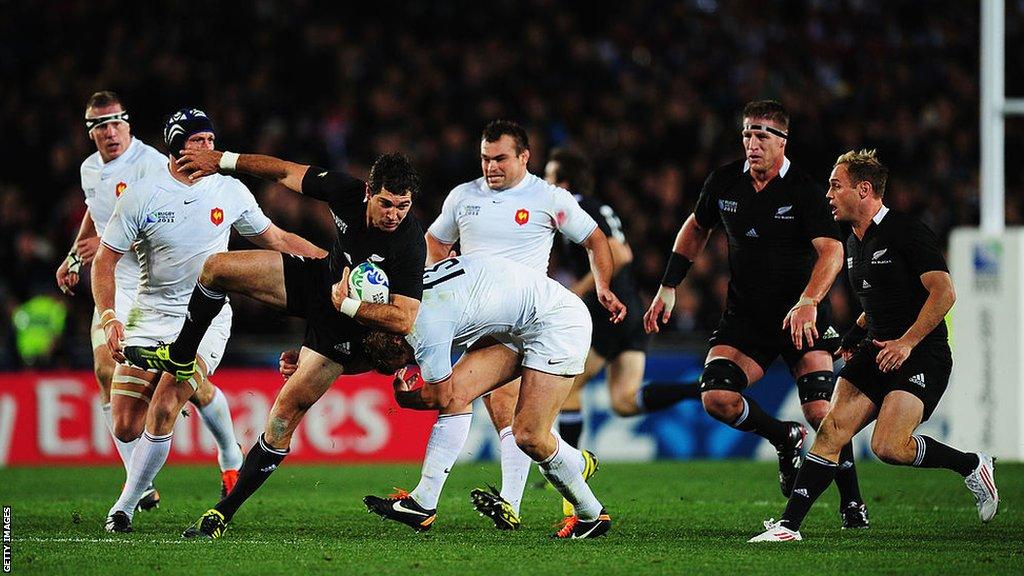
Fourth-choice fly-half Stephen Donald cut short a fishing trip to kick the final's winning goal
France progressed to face hosts New Zealand but All Blacks fly-half Stephen Donald kicked the winning goal having been called up in a mid-tournament injury crisis while fishing fishing for whitebait.
He had not originally answered the phone because he had deleted Graham Henry's number.
A heartbroken Wales struggled to lift themselves for the bronze medal match, losing 21-18 to Australia, and so failing to match their third-place finish in 1987. However, success would follow.
"We used that disappointment to drive us on," said Phillips. "We came back and won the Grand Slam the following year, another Six Nations title a year later and most of us won a series with the Lions. So something good came out of it."

